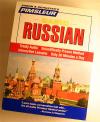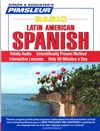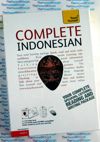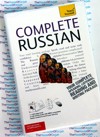Teach Yourself Complete Welsh - 2 Audio CDs and Book
2 CDs and 238 page Book
Are you looking for a complete course in Welsh which takes you effortlessly from beginner to confident speaker? Whether you are starting from scratch, or are just out of practice, Complete Welsh will guarantee success! Now fully updated to make your language learning experience fun and interactive. You can still rely on the benefits of a top language teacher and our years of teaching experience, but now with added learning features within the course and online. The course is structured in thematic units and the emphasis is placed on communication, so that you effortlessly progress from introducing yourself and dealing with everyday situations, to using the phone and talking about work.By the end of this course, you will be at Level B2 of the Common European Framework for Languages: Can interact with a degree of fluency and spontaneity that makes regular interaction with native speakers quite possible without strain for either party.
Learn effortlessly with a new easy-to-read page design and interactive features:
NOT GOT MUCH TIME?
One, five and ten-minute introductions to key principles to get you started.
AUTHOR INSIGHTS
Lots of instant help with common problems and quick tips for success, based on the author's many years of experience.
GRAMMAR TIPS
Easy-to-follow building blocks to give you a clear understanding.
USEFUL VOCABULARY
Easy to find and learn, to build a solid foundation for speaking.
DIALOGUES
Read and listen to everyday dialogues to help you speak and understand fast.
PRONUNCIATION
Perfect your pronunciation.
TEST YOURSELF
Tests in the book and online to keep track of your progress.
EXTEND YOUR KNOWLEDGE
Extra online articles at: www.teachyourself.com to give you a richer understanding of the culture and history of Wales.
TRY THIS
Innovative exercises illustrate what you've learnt and how to use it.
Official course - Teach Yourself Welsh is the official coursebook for the distance learning course of the University of Wales.
Website - additional practice material is available on the accompanying website.
Practical - the material is current and relevant to people living in Wales and needing the language for work or social reasons, as well as those learning Welsh for their own interest.
Table of Contents:
Introduction
Alphabet and pronunciation guide
Map of Wales
Mutation chart
Greetings
More about yourself
Talking about your family
Talking about your likes and dislikes
Extending and accepting an invitation
May I help you?
Asking for directions
What did you do?
There is something wrong with my car
I don't feel well
How were your holidays?
Where were you born?
When is your birthday?
Arranging your holiday
She'll go instead of you tomorrow
In the restaurant
Describing your house and area
What would you do?
What time is the next train?
Because I'm cold
You wanted to come
Appendix 1: regional variations
Appendix 2: how to say 'yes' and 'no' in Welsh
Key to the exercises
Welsh-English vocabulary
English-Welsh vocabulary
About the Authors:
Dr Christine Jones is Head of the School of Welsh and Bilingual Studies at the University of Wales Trinity Saint David. Julie Brake is a senior lecturer in Welsh at Glyndwr University,
Wrexham.
About the Welsh Language
Welsh is a member of the Brythonic branch of Celtic spoken natively in Wales, in England by some along the Welsh border and in the Welsh immigrant colony in the Chubut Valley in Argentine Patagonia. There are speakers of Welsh throughout the world, most notably in the rest of Great Britain, the United States, Canada, Australia and New Zealand. The most recent census figures (2001) presented in "Main Statistics about Welsh" by the Welsh Language Board, indicate 582,400 (20.8% of the population of Wales in households or communal establishments) were able to speak Welsh and 457,946 (16.3%) can speak, read and write it. This compares with 508,100 (18.7%) for 1991. Increasing use of the English language had led to a decline in the numbers of Welsh speakers. Since the introduction of the Welsh Language Act 1993, giving Welsh equal status with English in the public sector in Wales, this has been slowed.
A greeting in Welsh is one of 55 other languages included on the Voyager Golden Record chosen to be represenitive of Earth in NASA's Voyager program launched in 1977. The greetings are unique to each language, with the Welsh greeting translated into English as "Good health to you now and forever". The 2004 Welsh Language Use Survey shows 21.7% of the population of Wales are Welsh speakers. This is an increase from 20.5% in the 2001 census, and from 18.5% in 1991. The 2001 census also shows that about 25% of Welsh residents were born outside Wales. The number of Welsh speakers in the rest of Britain is unknown. In 1993, S4C, the Welsh-language TV channel, published the results of a survey into the numbers of people who speak or understand Welsh, and this estimated that there were some 133,000 Welsh-speakers living in England, about 50,000 of them in the Greater London area and border towns and villages in the Welsh Marches such as Oswestry.
Historically, large numbers of Welsh people spoke only Welsh, but monoglot Welsh speakers are now virtually non-existent, at least above school age. Almost without exception, Welsh speakers in Wales also speak English (or Spanish in Chubut Province, Argentina, see Welsh settlement in Argentina). However, some Welsh speakers are more comfortable expressing themselves in Welsh than in English. A speaker's choice of language can vary according to the subject domain and the social context, even within a single discourse (known in linguistics as code-switching). Although Welsh is a minority language, support for the language grew during the second half of the 20th century, along with the rise of organisations such as the nationalist political party Plaid Cymru from 1925 and the Welsh Language Society, Cymdeithas yr Iaith Gymraeg from 1962. Welsh as a first language is largely concentrated in the less urban north and west of Wales, principally Gwynedd, Conwy, Denbighshire, Anglesey, Carmarthenshire, north Pembrokeshire, Ceredigion, parts of west Glamorgan, north-west and extreme south-west Powys, although first-language and other fluent speakers can be found throughout Wales. Welsh is a living language, used in conversation by thousands and seen throughout Wales. The Welsh Language Act 1993 and the Government of Wales Act 1998 provide that the Welsh and English languages should be treated equally in the public sector, so far as is reasonable and practicable. Public bodies are required to prepare for approval a Welsh Language Scheme, which indicates their commitment to the equality of treatment principle. This is sent out in draft form for public consultation for a 3 month period, whereupon comments on it may be incorporated into a final version. It requires the final approval of the Welsh Language Board (Bwrdd yr Iaith Gymraeg). Thereafter, the public body is charged with implementing and fulfilling its obligations under the Welsh Language Scheme. The list of other public bodies which have to prepare Schemes could be added to by initially the Secretary of State for Wales, from 1993–1997, by way of Statutory Instrument. Subsequent to the forming of the National Assembly for Wales in 1997, the Government Minister responsible for the Welsh language can and has passed Statutory Instruments naming public bodies who have to prepare Schemes. Neither 1993 Act nor secondary legislation made under it cover the private sector, although some organisations, notably banks and some railway companies, provide some of their literature through the medium of Welsh.
Local councils and the National Assembly for Wales use Welsh as a quasi-official language, issuing their literature and publicity in Welsh versions (e.g. letters to parents from schools, library information, and council information) and most road signs in Wales are in English and Welsh, including the Welsh versions of placenames. However, some references to English destinations are still given in English only. Since 2000, the teaching of Welsh has been compulsory in all schools in Wales up to age 16, and that has had a major effect in stabilising and to some extent reversing the decline in the language. It means, for example, that even the children of English monoglot migrants to Wales grow up with some knowledge of the language. However, the vast majority of people in the main population centres of South Wales do not use the language in daily life.
Although most road signs throughout Wales are bilingual, the wording on money is in English only (This is apart from the legend on Welsh pound coins dated 1985 and 1990, which are valid currency in all parts of the UK: Pleidiol wyf i'm gwlad, which means, "True am I to my country"), and derives from the Welsh National Anthem. The new British coinage from 2008 will not bear any Welsh language at all, despite being designed by a resident of North Wales and being minted at the Royal Mint in Llantrisant, South Wales. Although many shops employ bilingual signage, Welsh rarely appears on product packaging or instructions. The UK government has ratified the European Charter for Regional or Minority Languages in respect of Welsh. The language has greatly increased its prominence since the creation of the television channel S4C (and subsequently S4/C, S4/C2) in November 1982, which broadcasts 70% of Channel4's programming along with a majority of Welsh language shows[13] during peak viewing hours. Additionally, there is an all-Welsh language digital station available throughout Europe on satellite called S4/C2, in existence since 1998. The main evening television news provided by the BBC in Welsh is available for download. There is also a Welsh language radio station, BBC Radio Cymru, which was launched in 1977. There is, however, no daily newspaper in Welsh, the only Welsh language national newspaper Y Cymro ("The Welshman") being published once a week. A daily newspaper called Y Byd ("The World") was scheduled to be launched on 3 March 2008 but has been scrapped, owing to low sales of subscriptions and insufficient funds being made available from the Welsh Assembly Government. Since December 2001 the British Government has planned to ensure that all immigrants know English. It remains to be seen if Welsh will be considered a separate case. At present, a knowledge of Welsh, English or Scottish Gaelic is sufficient for naturalisation purposes and it is believed that this policy will be continued in any proposed changes to the law.
|
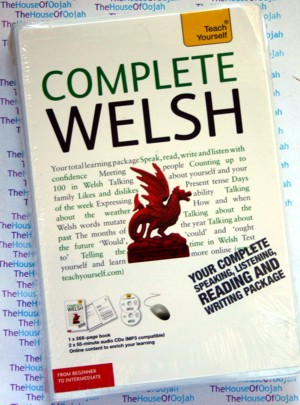


 0 Items (Empty)
0 Items (Empty)

